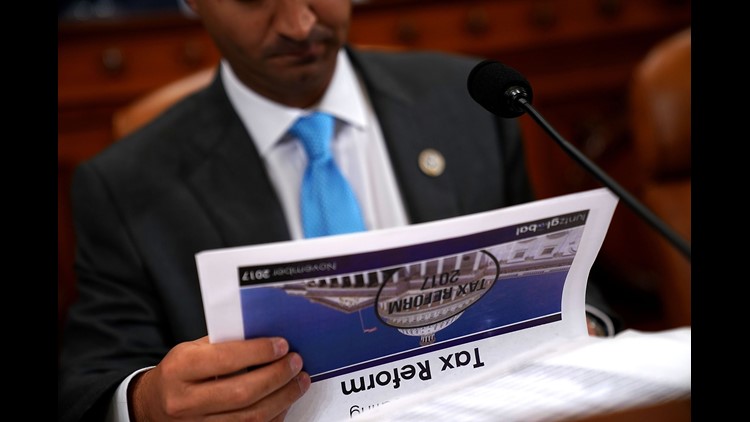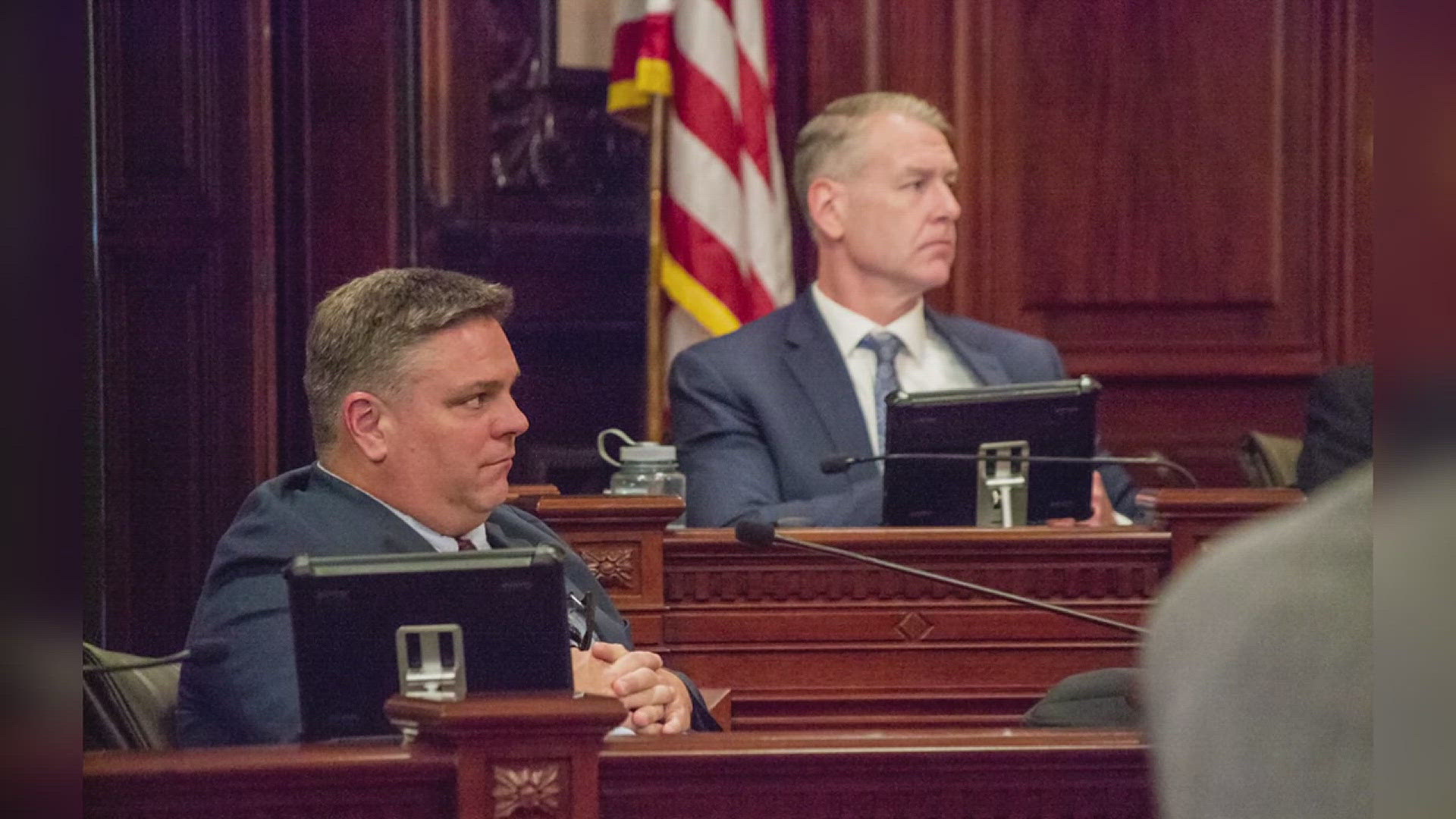(CNN) -- The House of Representatives passed major tax reform legislation along party lines, advancing a key agenda item for President Donald Trump and congressional Republicans.
The vote was 227-205, with 13 House Republicans joining all Democrats to oppose the bill. As the vote tally passed the majority mark, Republicans in the House began to cheer. At the same time, Democrats on the other side of the chamber also began to cheer -- and wave goodbye to their colleagues across the aisle, as both sides see the legislation as a polarizing issue going into next year's midterms.
While the bill's passage in the GOP-controlled House was largely drama free, the prospects for the measure are more unclear in the Senate where Republicans hold a slim two-seat majority. On Wednesday, Wisconsin GOP Sen. Ron Johnson announced he opposes the current Senate version and a handful of others have raised concerns. Republican leaders have vowed to get a tax bill to the President's desk by the end of the year.
Trump spoke to the conference ahead of the vote, but members say it's not because leadership is worried that they lack the votes. Leadership aides tell CNN they're confident they are in a good place, able to pass legislation that drops the corporate tax rate, reduces the number of tax brackets and simplifies the code just two weeks after the bill was unveiled.
"I think the health care debacle helped us prepare for this one," Florida GOP Rep. Dennis Ross told CNN, adding, "I think all the members also realize that this is very crucial, that we need a tax bill out of here, and I think that's why there's not a lot of angst over whether we have the votes tomorrow. I think we'll be right on target."
But Republicans are also cautious that this is the first step in a multi-stage process. Passing their bill is just the first vote. Republicans in the House are conscious that the Senate still has its work to do, not to mention that most expect a tedious process of melding the two measures to follow. One member quipped on background, "Conference is gonna be brutal."
The President was in a very jovial mood Thursday morning, according to a source in the room, and another said the President urged Republican members to sell the plan as "the biggest tax cut in history." He praised Ways and Means Committee Chairman Kevin Brady and said he was such a nice guy. "He really likes Kevin Brady that's for sure," the source said.
Rep. Steve Womack, a Republican from Arkansas, said Trump acknowledged that the Senate is an obstacle on taxes, but he was in a great mood and told members that "they'll come around," according to Womack.
There is no denying that there is a bit of apprehension on the part of House members that the Senate could fail to pass their bill, but Trump remains upbeat about the bill's prospects in the upper chamber, Womack said.
The appetite to pass something and deliver a major legislative accomplishment to the President's desk before the end of the year is a core guiding principle for the party right now, a force so strong that the typical divisions that have hobbled the party in the past have been rare in the days leading up to the vote. Even after the Senate announced it would include a repeal of the Obamacare individual coverage mandate in its bill -- something members of the House Freedom Caucus and Republican Study Committee have been calling for for weeks -- conservatives ultimately punted the decision to their leadership, who assured the conference that it would be better to wait until the Senate actually passed its bill before including the measure in theirs.
"Nothing should distract or endanger our efforts to pass the Tax Cuts and Jobs Act, and if this committee believes this Walker amendment could be a disservice to our common goal of passing H.R. 1, then I respect that decision," North Carolina Rep. Mark Walker, the leader of the Republican Study Committee, said Tuesday night in a late-night rules committee hearing on the bill as he pushed to include a repeal of the individual mandate.
It's not that the tax bill hasn't been without its controversies. Its rollout was delayed by a day two weeks ago after Republicans failed to meet their self-imposed deadline amid divisions over what to do about a popular deduction for state and local income, property and sales taxes. On Wednesday, a few members were still adamant they won't back the bill over it.
"I whipped no and I haven't changed my mind," said Rep. Darrell Issa, a Republican from California. "I have had many people trying to call me, but nobody has a convincing argument for my district and for the state of California."
It's anticipated that many of the Republicans who will vote no Thursday will do so over concerns that the bill hurts individuals in expensive areas like California, New Jersey and New York. But even in those cases, some members say they were able to get feedback from leadership that assuaged their concerns.
California Republican Rep. Mimi Walters told CNN, "I think we learned lessons with the health care bill and we learned that we needed to work more closely together, and that's what you are seeing right now."
Walters said she had spoken to House Speaker Paul Ryan, R-Wis., of her concerns about the bill doing away with the state and local income tax deduction, but ultimately decided she'd vote "yes."
"We come from a very high-taxed state. We're a very liberal state in California, our government is, and we have a have a very high cost of living because of the liberal policies, and I have always said as long as middle-income Americans have more money in their pocket I will be supporting the tax package," Walter said.
Ryan has repeatedly asserted that some Democrats will end up voting for the bill. But the top House Democratic vote counter, Maryland Rep. Steny Hoyer, told reporters Wednesday, "I do not think we will lose anybody."
The last major overhaul of the tax code, more than 30 years ago, was a lengthy negotiation between both parties and passed with bipartisan support.
New Jersey Rep. Josh Gottheimer, one House Democrat who was in regular touch with top White House officials, said that unlike many of his colleagues he supported lower corporate rates and was open to supporting a tax reform package. But he said the elimination of the break for state and local taxes was something Republicans in his district were mad about and he could never back. "I don't understand how the people who vote for this bill are going to survive politically given that they are voting for a tax hike on their citizens."
Ultimately, members say the bill was able to attract GOP lawmakers from across the ideological spectrum (the one member who voted against Ryan for speaker -- Kentucky's Thomas Massie -- has even said he supports the bill) in part because the optics of tax cuts were always more politically palatable than the optics of taking away people's insurance in an Obamacare repeal bill.
"This is what Republicans do. We cut taxes," said Rep. Mike Simpson, a Republican from Idaho. "Health care was a new arena for us."
Behind the scenes, one Republican leadership aide told CNN that the whip team turned around their work in a mere two days after gauging there was plenty of support for the legislation they were preparing to put on the floor.
"We have worked really closely with individual members to ensure they have the info and data they need as far as how this affects their districts, and have been really pleased with those conversations, so we are very happy with where we are and looking forward to a good vote," the aide said. "Members are very focused on getting this done, and the conference is really unified."
House GOP Whip Steve Scalise was confident Wednesday evening, telling CNN's Phil Mattingly, "I know the House is going to pass this bill. I'm one of those people who believes failure is not an option."
Things across the Capitol are also looking a bit more up in the air. On Wednesday, Sen. Ron Johnson of Wisconsin announced he was a "no" on the current Senate tax bill, giving Majority Leader Mitch McConnell of Kentucky wiggle room to lose just one more member of his conference.
Republican House members aren't planning any White House Rose Garden ceremonies to celebrate their win with the President just yet, noting that the meeting with Trump on tax reform was specifically scheduled before the floor vote.
"You haven't seen the party hats and the kazoos," Walker joked Wednesday night ahead of the vote. "We know this is not done yet."



